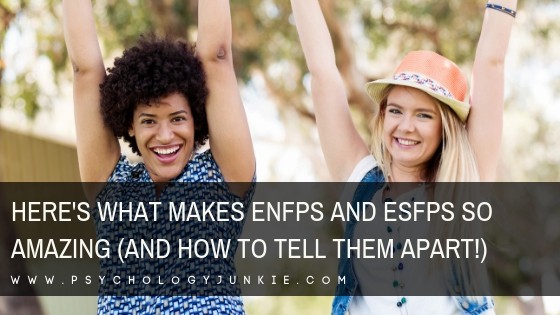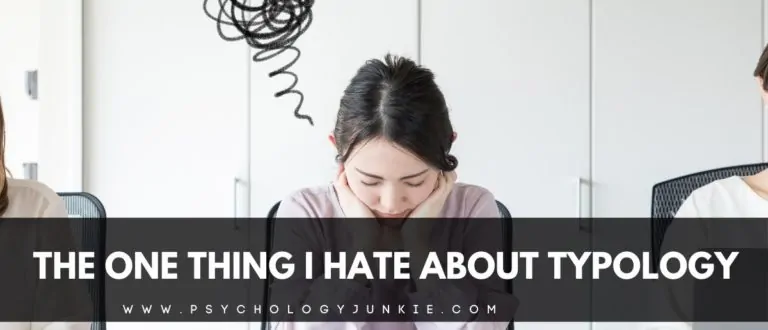ENFP or ESFP – Which One Are You?
Can’t decide whether you’re an ENFP or an ESFP? These two personality types tend to mistype as each other A LOT. In fact, as an MBTI® practitioner I encounter this mistype more than almost any other. Read on to discover 5 reasons these types are essential in our world and how to tell them both apart!
Not sure what your personality type is? Take our new personality questionnaire here. Or you can take the official MBTI® here.

ENFP or ESFP – Why They’re Both Awesome (and How to Figure Out Which One You Are)
#1 – ENFPs and ESFPs Hold Space for Your Values
One thing that EFPs cannot stand is seeing anyone have their values, beliefs, or ideals smothered or ignored. They are strong believers in personal freedom and the belief that each human being has a right to their individuality and self-expression. They are curious about people from all walks of life and are legitimately interested in understanding the “why” behind each individual’s thinking. They want to give everyone the time and space to express what they really feel without pushing them to be something different.
#2 – ENFPs and ESFPs Make You Believe in Opportunity
Both ENFPs and ESFPs believe in the promise of possibility and opportunity. They don’t want to waste a moment when there is so much that can be experienced or explored. While they both look at opportunity and possibility in different ways, their pure enthusiasm is nothing short of contagious.
#3 – ENFPs and ESFPs Make You Feel Like Life is an Adventure
Both of these personality types hate to do things in a repetitive, mundane way. They don’t mind tossing tradition on its head so that they can explore an innovative new way of doing things. They like change, adaptation, and novelty. Their exuberance and sense of fun encourages the rest of us to step outside of our comfort zones and see things in new, open-minded ways.
#4 – ENFPs and ESFPs Know How to Get in Your Shoes
ENFPs and ESFPs are known for empathizing deeply with the concerns of other people. They try to imagine “How would that feel if that were me?” before passing a judgment or giving advice. They believe that each individual is completely unique and they tend to dislike tired, empty platitudes that don’t actually help in real life.
#5 – ENFPs and ESFPs Are Creative
Both ENFPs and ESFPs enjoy thinking creatively. When crisis situations come up, both of these types are known for rapidly thinking outside-the-box to come up with unusual and sometimes ingenious solutions. Both types enjoy bringing new ideas, objects, and experiences to life!
ENFP or ESFP – The Differences
ENFPs are Dreamers – ESFPs are Realists
Both ENFPs and ESFPs love the thrill of opportunity and possibility. However, ENFPs tend to get more excited by concepts, theories, and ideas whereas ESFPs get more excited by experiences, actions, and the sights, sounds, and textures of the world around them. An ENFP might happily spend hours discussing life on other planets or the various interpretations of a concept like love, whereas an ESFP would be happiest directly engaging with the world in an interactive way. For them, getting together with friends and going to a concert, wine tasting, or swapping jokes would be more invigorating. Remember, both types can enjoy BOTH things – what matters is which category is more natural to them on a consistent basis.
ENFPs Use Metaphor and Analogy – ESFPs Speak Literally
ENFPs tend to use a lot of metaphor and analogy when they are speaking. ESFPs use more literal, concrete language. ENFPs will talk more about theoretical ideas, whereas ESFPs will talk more about possible experiences and actions.
ENFPs Learn By Theorizing – ESFPs Learn By “Doing”
ENFPs learn best when they can hypothesize possible scenarios out loud or imagine different concepts working together. Entertaining and envisioning ideas in their mind and then extrapolating those ideas with other people helps them to understand new things. They are drawn to the abstract more than the real.
ESFPs learn best when they can get their hands directly on something. They want to get into action right away and they want real-world examples of how something will work. Hypothesizing, extrapolating, and theorizing can be fun for small bursts of time – but they have a rapid desire to get moving, have some fun, and make a tangible difference in their environment.
ENFPs Are Oriented to Impressions – ESFPs Are Oriented to Details
ENFPs have inferior sensing, which results in them occasionally being oblivious to details. They are more attuned to underlying meanings, patterns, connections, and impressions. They are less interested in physical stimulation and excitement and more interested in stimulating their imagination or toying with concepts. For example, discussing the enneagram for a few hours or talking about spiral dynamics over a cup of coffee might sound thrilling to an ENFP.
ESFPs notice colors, sights, sounds, and textures in high-definition. They have inferior intuition, which means that they can sometimes be oblivious to underlying patterns and abstract connections. They are extremely observant to what is going on around them and can spend a great deal of time simply enjoying sensory stimulation. The idea of a one-hour massage or a high-energy concert would probably be extremely exciting to an ESFP!
Remember, there are times when BOTH types will enjoy either of those activities – but which one more naturally draws their attention? Which one more consistently seems exciting? Therein lies your answer!
Under Extreme Stress ESFPs Get Gloomy – ENFPs Get Tunnel Vision
In cases of very extreme stress, ESFPs lose their typical optimistic focus and become gloomy. They feel like the future holds nothing but negative possibility and can sound very resolute about how bad things will be. They start to see patterns that confirm their negative premonitions.
ENFPs, in contrast, lose their normal ability to brainstorm and see numerous possibilities, and become hyper-focused on one project or detail. Normally oblivious to the details, they suddenly become obsessed with them. They may even become hyper-aware of inner-body sensations and worry that they are suffering from an illness. They become more paranoid and overwhelmed with minutiae.
What Are Your Thoughts?
Both of these personality types are incredible. There is no one that is better than another. Do you have any ideas you’d like to share? Let us know in the comments!
Find out more about your personality type in our eBook, Discovering You: Unlocking the Power of Personality Type.
More Articles About ESFPs and ENFPs:
3 Weird and Wonderful Secrets About the ENFP Personality Type
10 Things You Should Never Say to an ENFP
10 Things You’ll Relate to if You’re an ESFP
10 Things You Should Never Say to an ESFP










As always, you’ve delivered personality truths in a spectacular way! As an ENFP, I completely related to all your points. Thank you for your stunning blog, Susan!
Thanks so much MacKenzie! I really appreciate your encouragement and feedback! 🙂
Intuitives can also learn by doing as well and Sensors can also learn through theorizing and lesson school style learning and talk. So theres some flaws also to this and these differences here.
This was so helpful. I’ve thought for years that I was an ENFP, but when you described what an ENFP thinks is fun, I cringed! Thank you.
My god I’m defo a combination of both
Lmao I thought I was nuts because of my paranoia now I know it’s just my personality
Thanks for the article. It’s very accurate. I’m a ENFP & my sister is an ESFP. We’re a lot alike, but also have differences. Your article was pretty spot on!